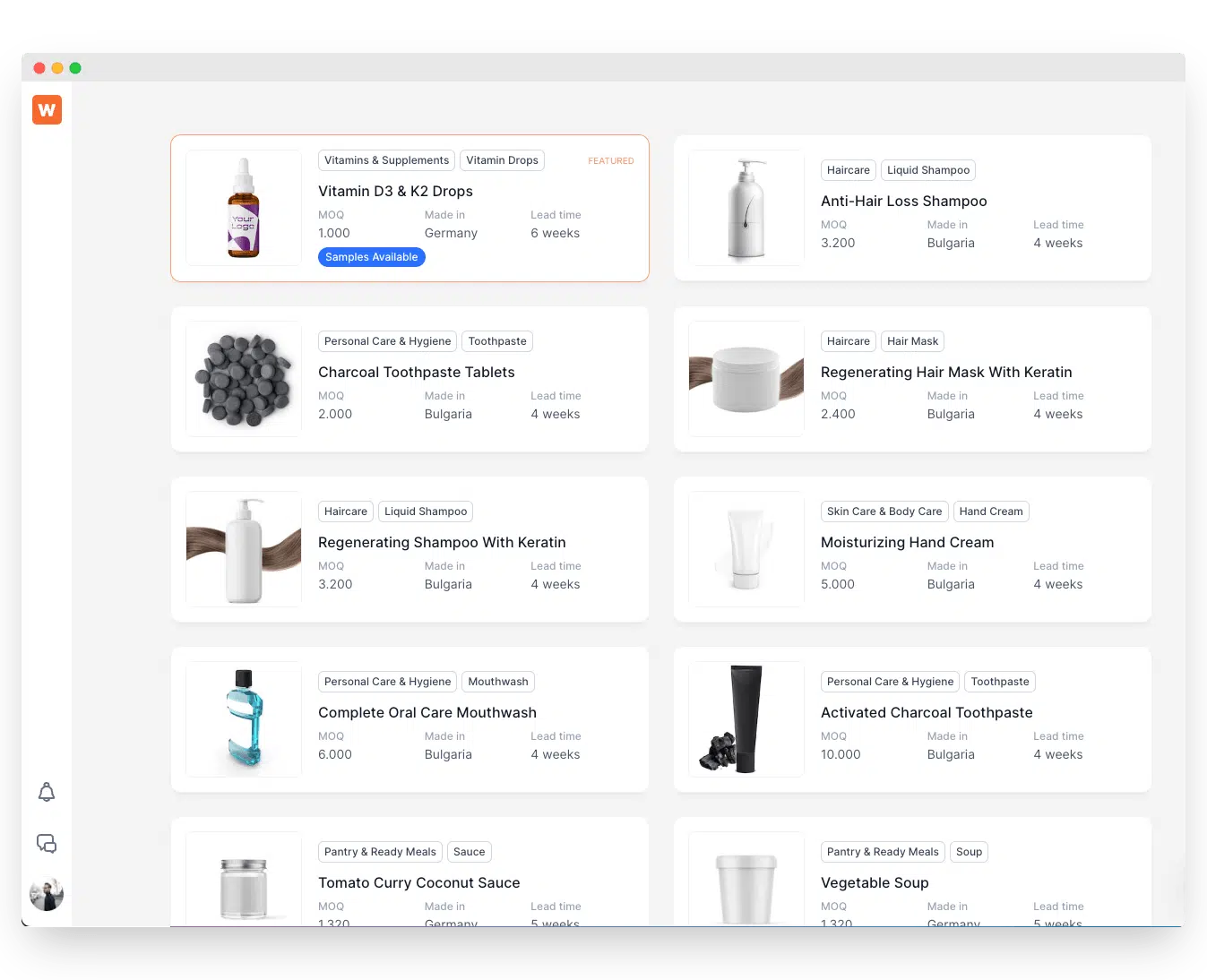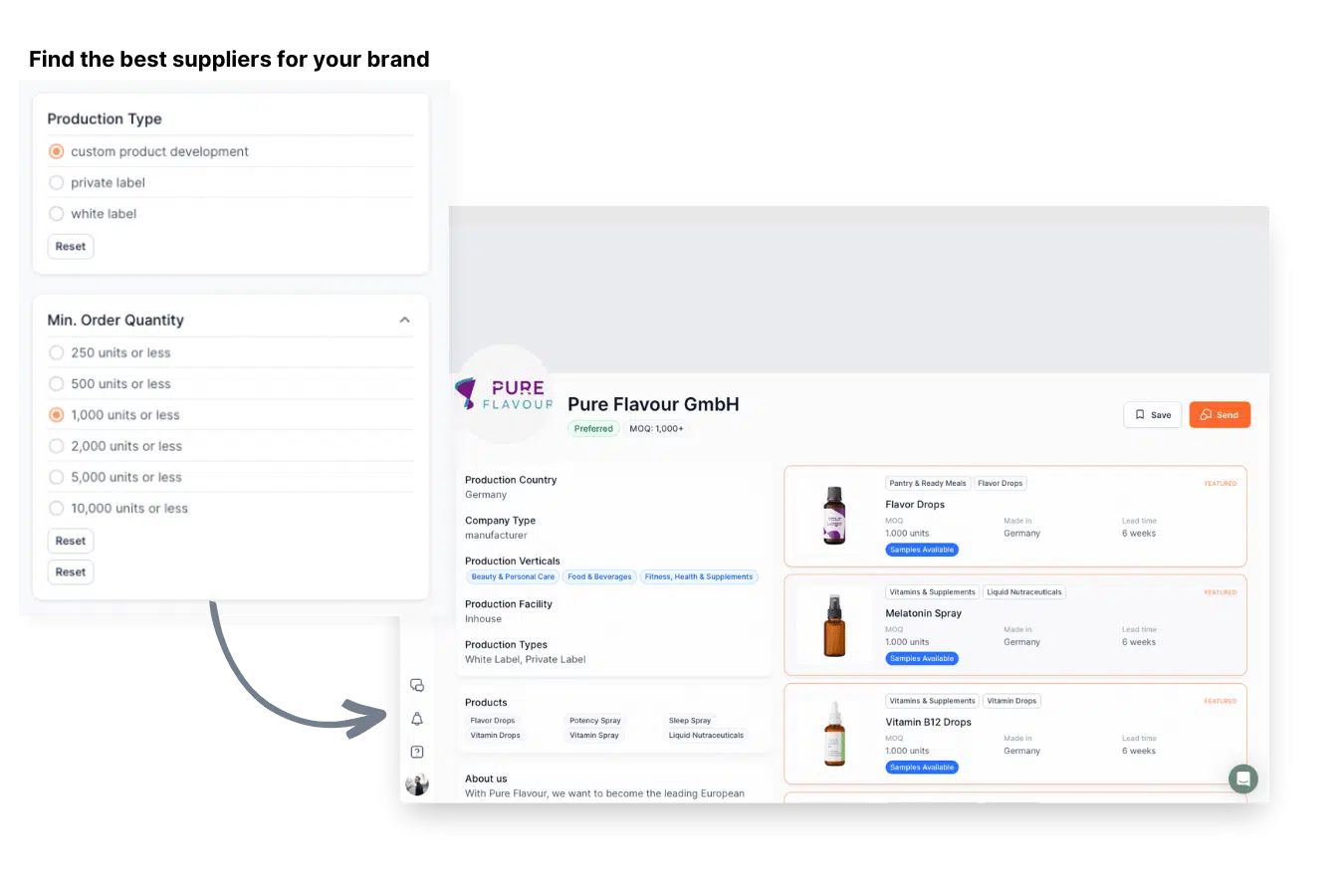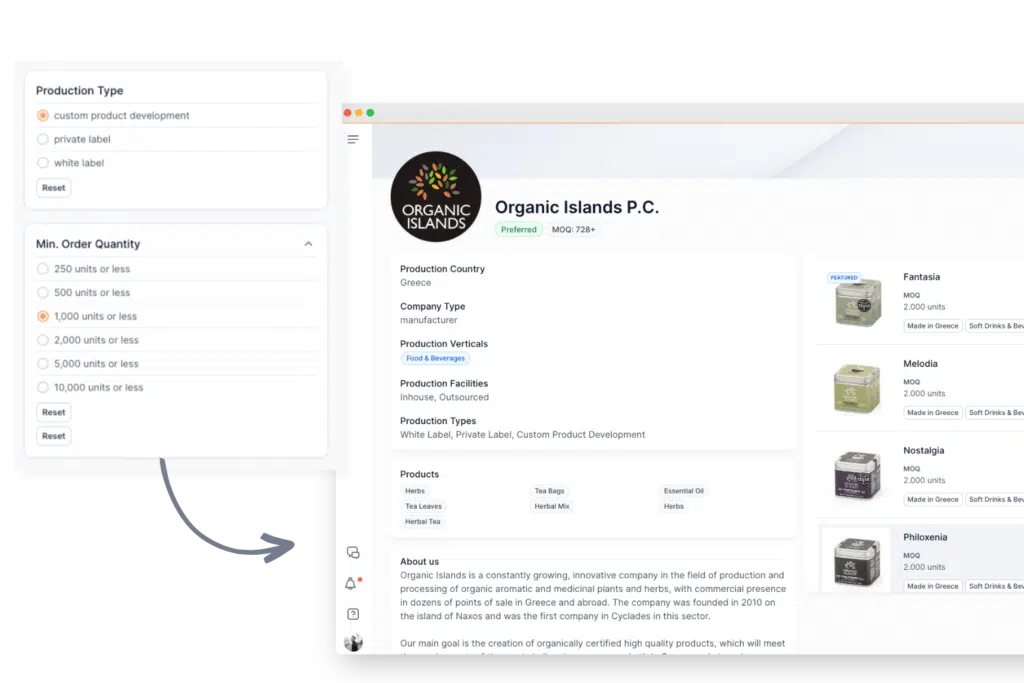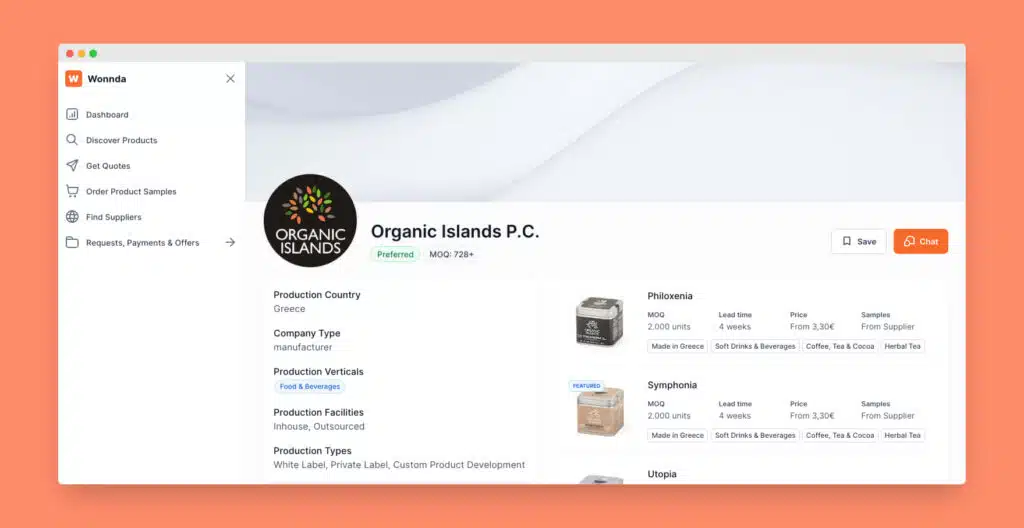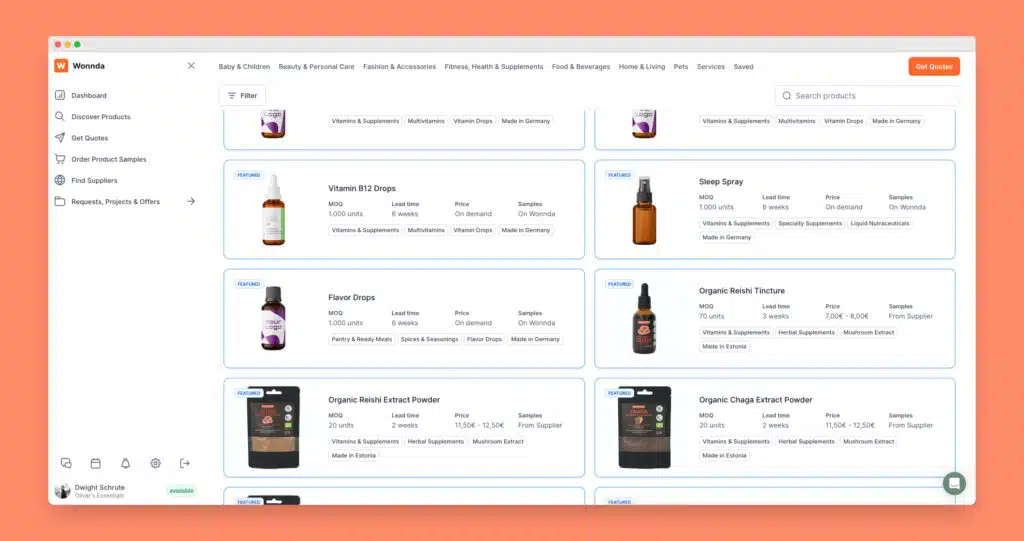Best private label manufacturers for your business



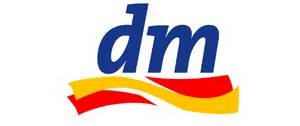

Find verified private label manufacturers with Wonnda
Discover trusted private label manufacturers through Wonnda, your gateway to a curated network of suppliers. Our platform offers unparalleled, fully-digital access to qualified manufacturers, predominantly based in Europe, specializing in a broad range of consumer goods – from beauty, food, supplements and apparel to pet products and beverages.
- 8.000+ buyers trust wonnda
- Direct access to 20.000+ private label manufacturers within Wonnda
- 5.000+ private label products for your brand
- Custom products through our RFP feature

The exclusive B2B platform to find verified private label manufacturers
Every supplier on Wonnda undergoes a rigorous vetting process to ensure they meet high-quality standards, allowing you to source with confidence.
Navigate our digital marketplace to find the right fit for your brand, and utilize our integrated workflow tools to manage the entire sourcing process seamlessly. Choose Wonnda to simplify your private label journey and ensure a reliable, efficient partnership with top-tier manufacturers.
- Verified suppliers & manufacturers for your brand
- Directly work with suppliers, no middleman
- Faster lead times & fully digital sourcing experience
Additional services for private label manufacturers
Product design & development
Legal, financial and insurance Services
Primary & secondary packaging
Fulfillment, logistics, warehousing
The private label platform for the next generation
Wonnda is the fastest-growing B2B platform dedicated to private label and contract manufacturing of its kind. A fully digital sourcing experience built by entrepreneurs and a dedicated team, who have been there before.
Sign up for free and find your private label manufacturer
20.000+ Best private label manufacturers for your business
Wonnda’s comprehensive sourcing solution gives you access to 8.000 private label manufacturers for your business. All of the manufacturers are verified by our team. Furthermore, brands and buyers can benefit from our additional network of more than 20.000 private label manufacturers and suppliers by joining Wonnda.
Preferred partner of Wonnda
1. Organic Islands - Greece
Based in Greece, Organic Islands specializes in cultivating and processing a range of organic herbs and medicinal plants. The company has a widespread retail footprint, both within Greece and internationally.
In addition to crafting private and white-label teas, Organic Islands also boasts a diverse selection of herbs, essential oils, and unique spices.
To discover pricing details, minimum order requirements, and other specifics, connect with Organic Islands through Wonnda.
2. MUSHEEZ - Estonia
3. MAG Cosmetics - Germany
ith over three decades of experience, MAG Cosmetics, situated close to Stuttgart in Bietigheim-Bissingen, specializes in crafting high-quality cosmetic goods for private label clients. Whether you’re looking for haircare essentials, body lotions, colorants, or sprays, MAG Cosmetics delivers tailor-made solutions that prioritize quality, efficacy, and safety.
Discover minimum order requirements, private label offerings, and more via the Wonnda platform. Register on Wonnda at no cost to connect with MAG Cosmetics GmbH and receive a personalized quote.
4. Private Label LTD - Bulgaria
Rapidly expanding in the cosmetic sector, Private Label Cosmetics LTD focuses on creating top-tier branded items. Located in Bulgaria, a nation with a rich history in cosmetics, and backed by a team boasting over two decades of industry experience, they offer customized solutions to meet the unique needs of any brand.
Explore minimum order sizes, exclusive private label offerings, and additional details through Wonnda. Join the platform for immediate access to Private Label Cosmetics LTD.
5. WDM Bio - Germany
Based in Müncheberg, Germany, WDM Bio-Fertigprodukte GmbH excels in crafting private label food items, with a focus on vegan and organic soups, stews, and prepared dishes. Established in 2013, the company has experienced swift growth and has expanded its reach to more than 10 nations, such as Germany, Austria, Switzerland, and the Netherlands.
Use your Wonnda account to instantly discover minimum order requirements, explore their product range, and gain additional insights.
Sign up to access 8.000 more private label manufacturers
Use your business email address. The email will be used to create a free account. No credit card required. By signing up, you are accepting our terms & conditions & privacy policy.
Definition: What is private label and how does it work?
Private label, also known as store brands, refers to a type of production where products are manufactured by one company (“private label manufacturer” or “private label supplier”) but sold under another company’s brand name. This business model is commonly used across various industries to offer consumers unique, often exclusive, products.
While the terms “white label” and “private label” are often used interchangeably, it’s important to note that there are differences between private label and white label manufacturing, hence both production types are not entirely synonymous. Both involve products manufactured by one company and sold under another’s brand name. However, white label typically refers to generic products that multiple companies can brand and sell, while private label is more exclusive, often customized to the specifications of the single retailer carrying it. Despite these nuances, the terms are frequently used as synonyms, especially in contexts where the distinction between generic and custom products is less critical.
Retailers ranging from well-known supermarket chains to e-commerce startups adopt private labeling strategies to differentiate themselves in competitive markets. Whether it’s a line of private label cosmetics, such as private label skincare, private label food, supplements, pet products, jewellery, accessories, fashion and more, private label allows companies to control every aspect of the product—from its formulation and quality to its pricing and branding.
This practice not only builds brand loyalty but also allows for higher profit margins compared to simply reselling products from other brands.
What are private label manufacturers?
Private label manufacturers are manufacturing companies that produce products for other businesses to sell under their own brand names. They offer various services that typically include: Product Development, Manufacturing, Packaging and Branding, Quality Control and Logistics Support. These services enable businesses to offer unique branded products without the need for in-house manufacturing facilities.
Private label manufacturing is particularly popular in sectors such as:
- Clothing and Apparel
- Cosmetics and Personal Care
- Food and Beverages
- Health and Dietary Supplements
Private label product categories and ideas
Almost any product can be private labeled. There is almost an endless list of private label product ideas. From beverages, beauty products, supplements to high-end ceramics and kitchenware. Here are some of the most relevant private label product categories that you can have manufactured with vetted private label suppliers on Wonnda.
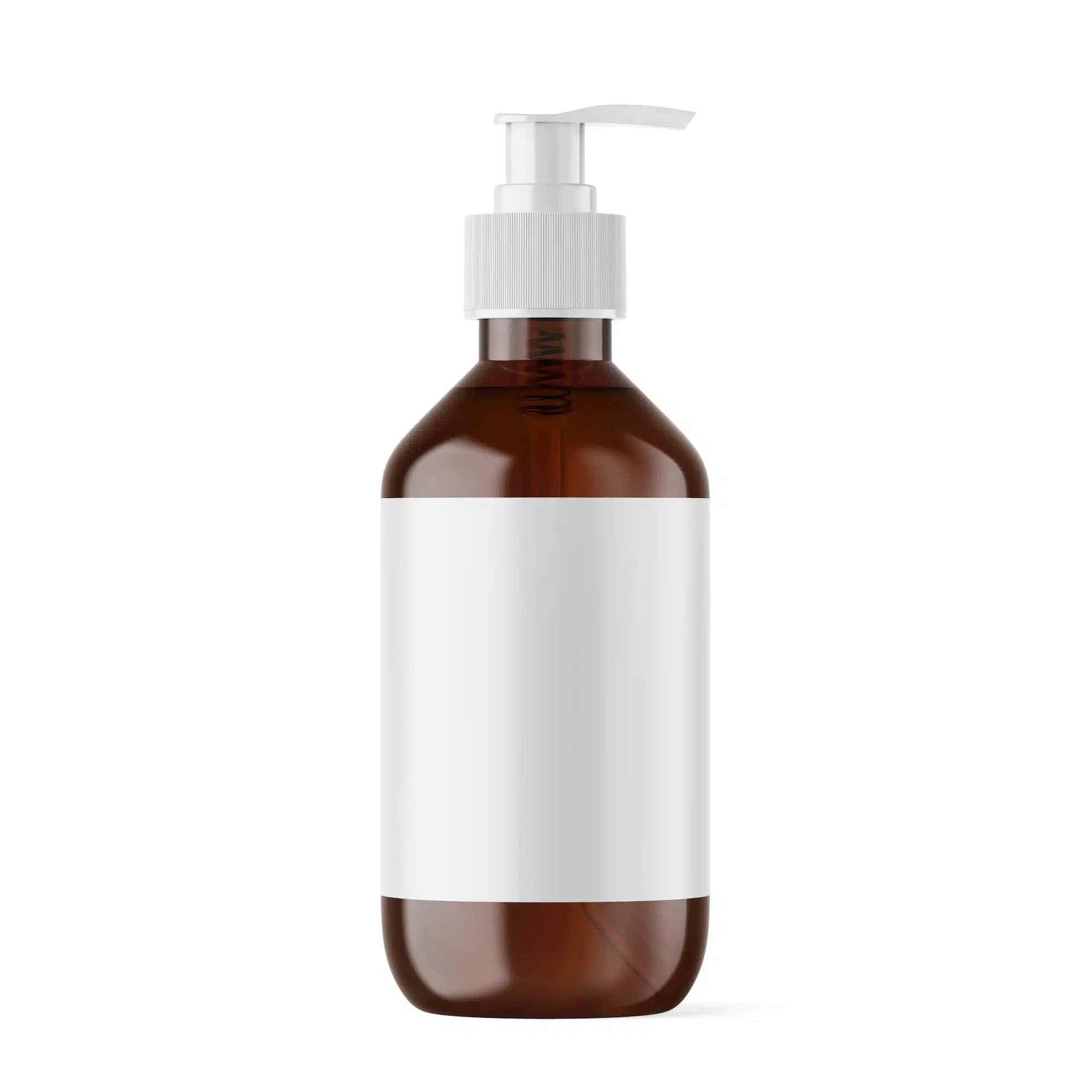
Find Beauty and Personal Care Manufacturers
- White Label
- Private Label
- Custom Products
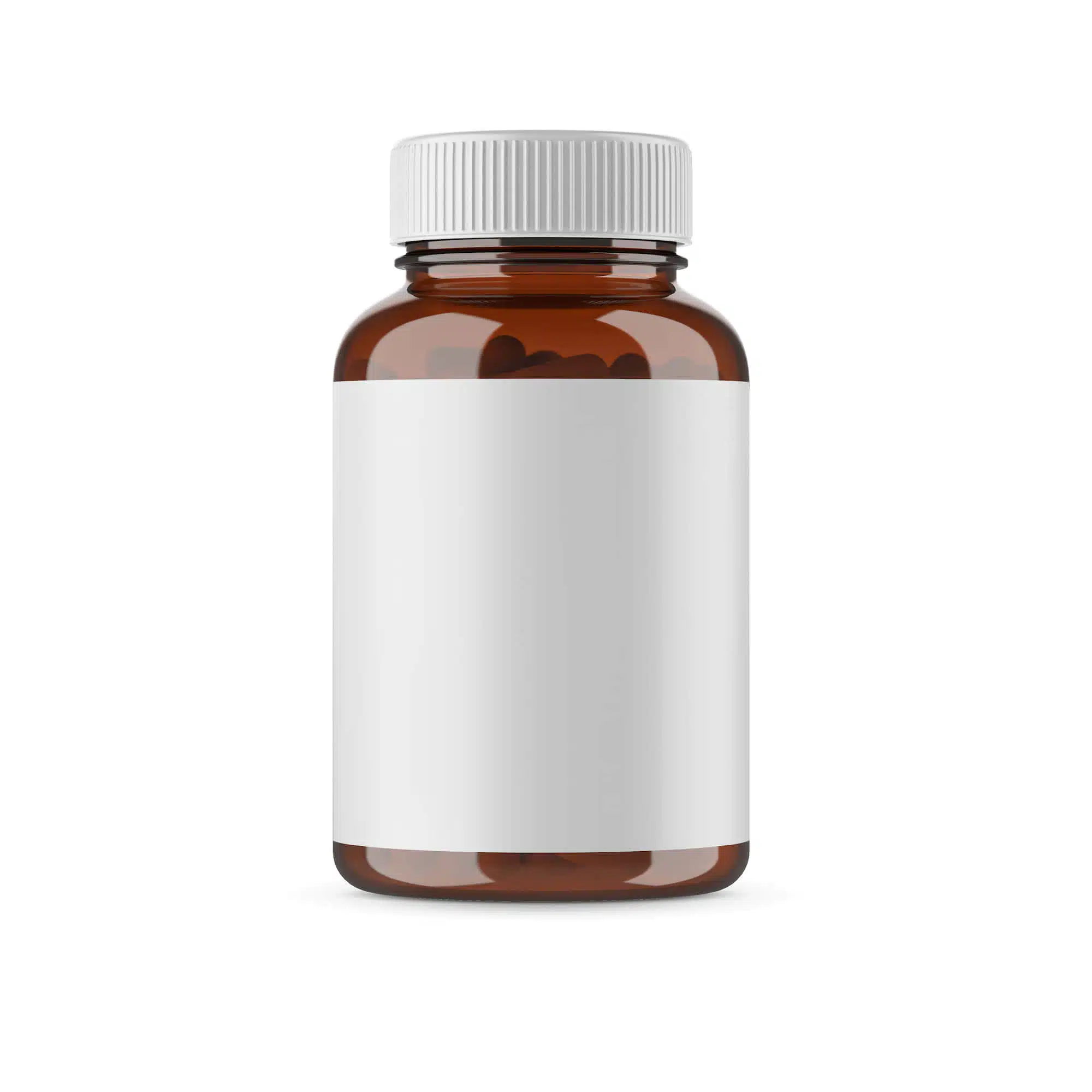
Find Supplements Manufacturers
- White Label
- Private Label
- Custom Products
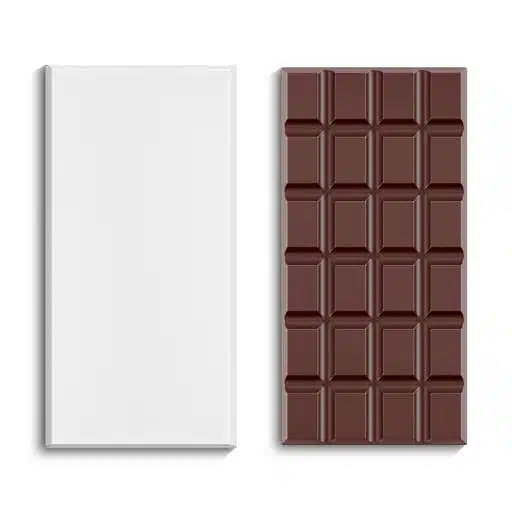
Find Food Manufacturers
- White Label
- Private Label
- Custom Products
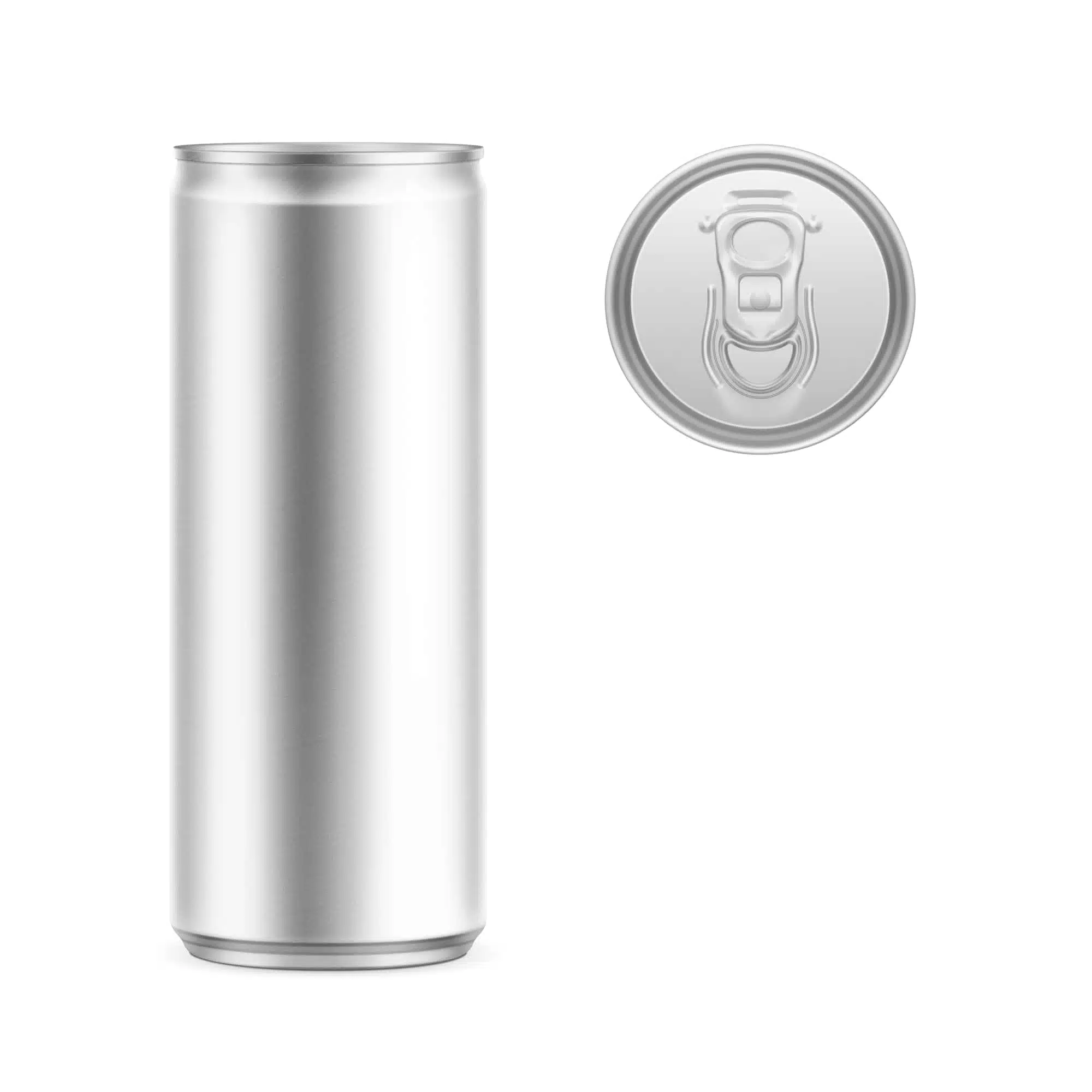
Find Beverages Manufacturers
- White Label
- Private Label
- Custom Products
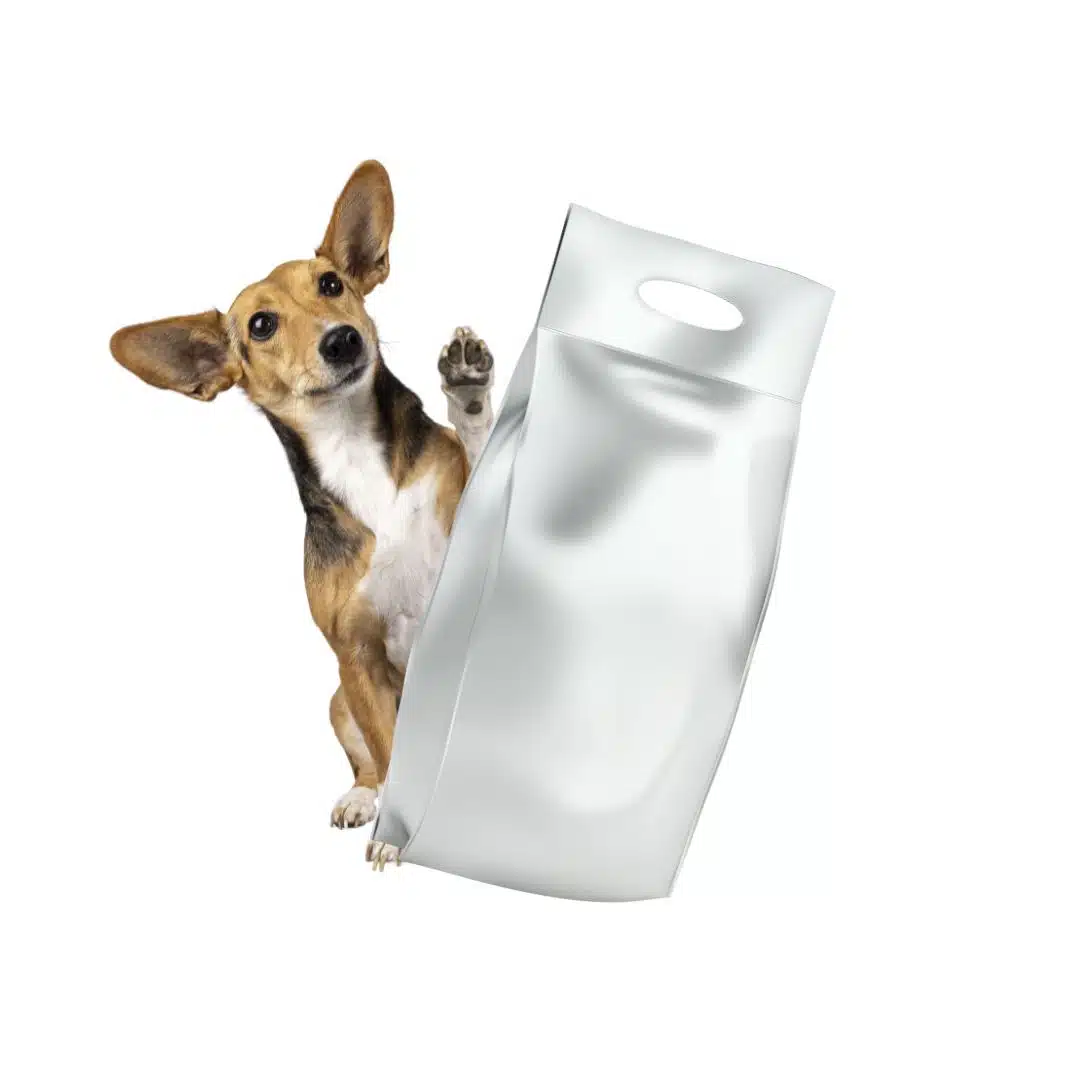
Find Pet Products Manufacturers
- White Label
- Private Label
- Custom Products
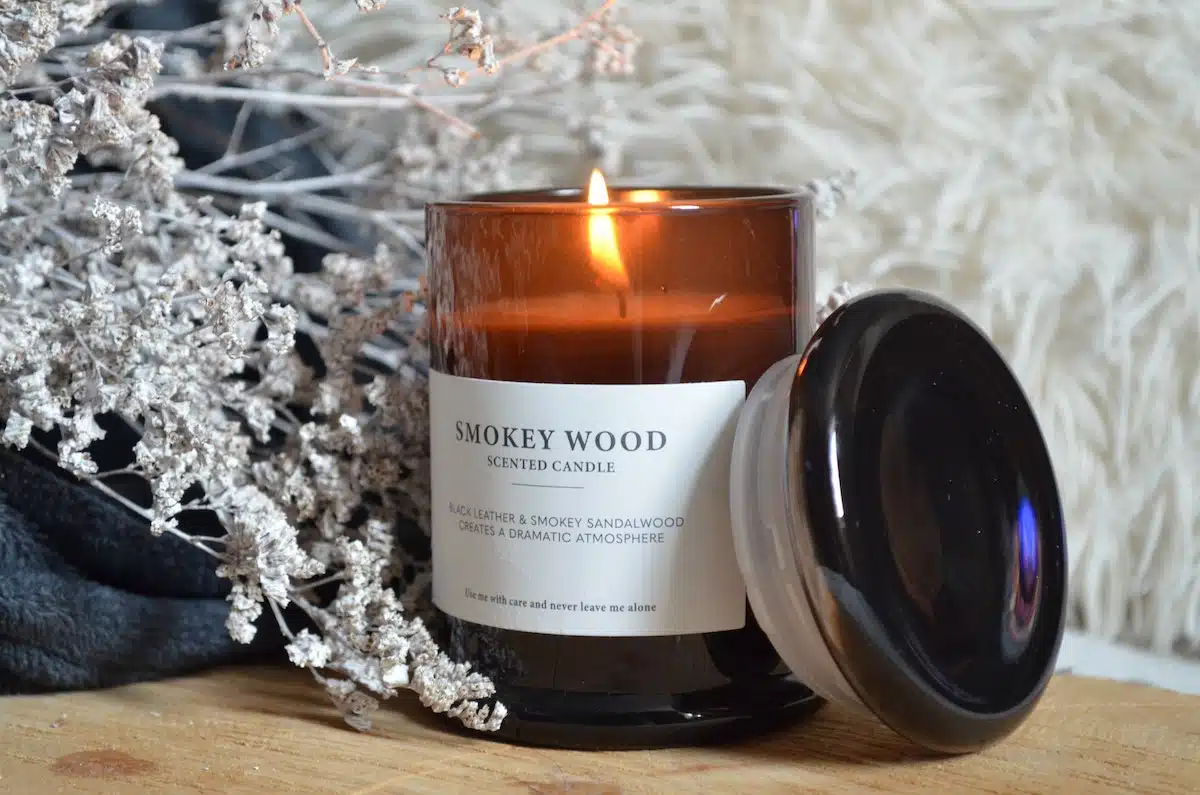
Find Candles Manufacturers
- White Label
- Private Label
- Custom Products
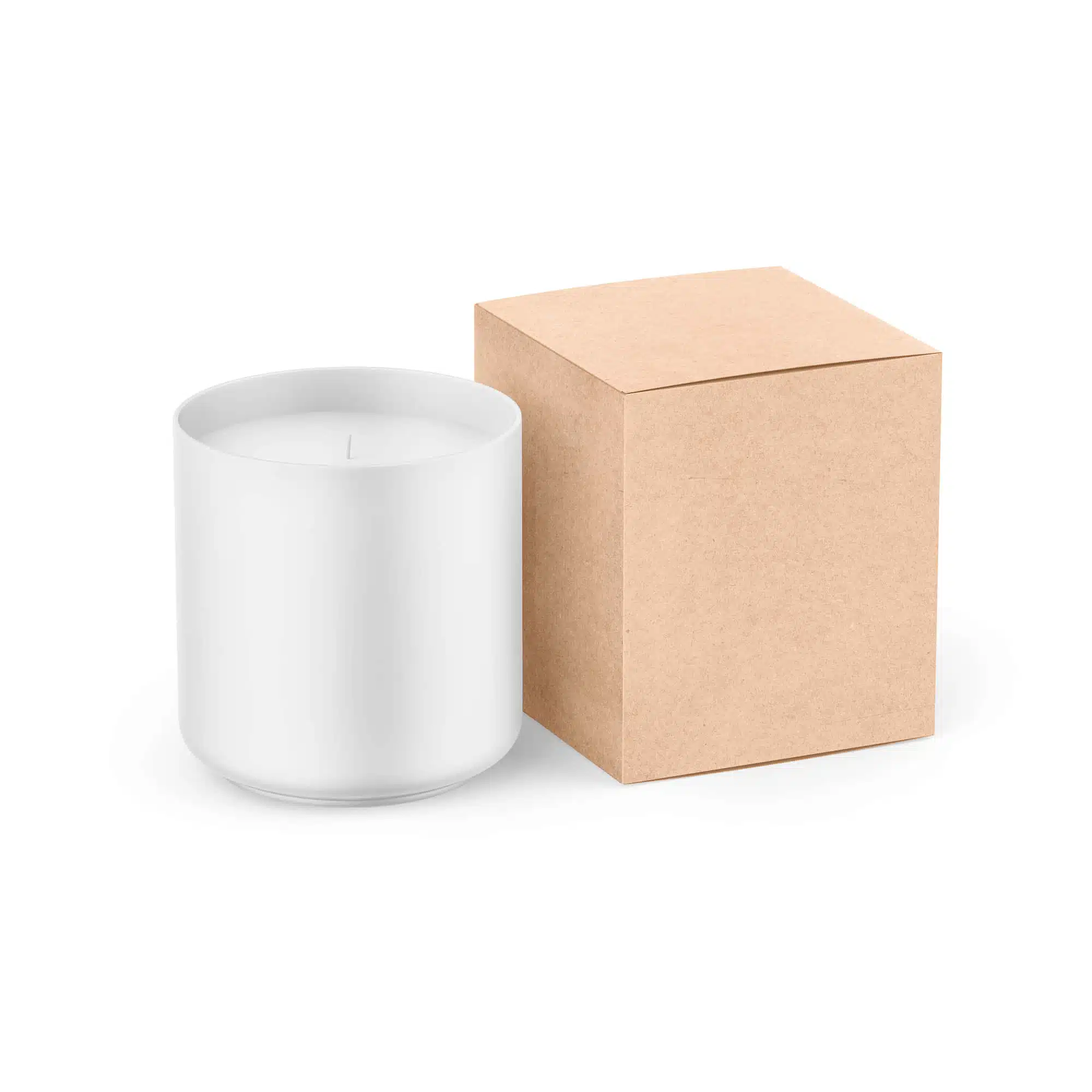
Find Home & Living Products Manufacturers
- White Label
- Private Label
- Custom Products
The private label sourcing process
Sourcing private label products and working with the right private label manufacturers can be a challenging task. The process of private label manufacturing involves a couple of different phases and tasks.
1. Research suitable private label products
The first step involves market research to identify gaps or opportunities in the market where your private label product can fit. You’ll also need to decide the product categories and specifications based on your target customer’s needs. Be aware that certain products may be more complex like others, due to certifications, product development cycles and the degree of customization.
On Wonnda you can access our private label catalog which includes more than 8.000 private label products. You can see the lead times, customization options, minimum order quantities (MOQs) and directly request the product and start projects with our vetted private label manufacturers suppliers.
2. Identify the right private label manufacturers
Once the product idea is clear, the next step is to find a manufacturer who can produce it. Digital B2B platforms like Wonnda can simplify this process by connecting you with a curated list of verified manufacturers that meet your specific needs. You can either browse through our supplier directory, the product catalog or submit a tender or RFP (Request for proposal) to get matched with suitable suppliers. Another option is to attend physical private label trade shows such as PLMA in Amsterdam or industry-specific ones like Cosmoprof in Bologna, Vitafoods in Geneva or BioFach/Vivanesse in Nuremberg.
3. Clarify customization options
In the private label model, you’ll work closely with the chosen manufacturer to customize the product. This phase involves specifying materials, ingredients, design, and other key features that will make your product unique.
4. Order samples
Before diving into a full-fledged partnership, sample ordering in private label is crucial. This allows you to personally assess the quality, durability, and overall fit of the product. It’s a pivotal step in confirming that the manufacturer can meet your expectations.
5. Assess the quality
Once you received your product samples, it’s time to assess if the product quality aligns with what you requested and agreed upon with the private label manufacturer. In this crucial phase it is important that you give clear feedback to the manufacturer and you may request additional samples or iterate on samples you ordered. It’s advisable that you and the manufacturer sign off on the final sample which is the product that should go into production.
6. Private label production
Once satisfied with the quality and compliance checks, the manufacturing process commences. The scale of production will be determined by your initial agreement with the manufacturer, budget constraints, and inventory strategy.
7. Branding & Packaging
Simultaneously with production, the branding elements such as packaging design, labeling, and promotional materials are developed. This is the phase where the product truly becomes an extension of your brand identity. You should already have assessed upfront if the private label manufacturer can also supply you with suitable packaging or if you have to source the packaging for your private label products yourself.
When you work on Wonnda, you have not only access to private label manufacturers, but you can also find packaging suppliers and have packaging tailored to your needs and brand values, such as sustainable packaging and more.
8. Logistics, Warehousing, Fulfillment
Post-production, the focus shifts to storage, shipping, and distribution. Whether managed in-house or outsourced to third-party logistics providers, this step is crucial for product delivery to end consumers.
Also here Wonnda can be of help. Wonnda partnered with multiple fulfillment companies so you can directly book your logistics providers right within the platform.
What is the overall share of private label in retail?
The overall share of private label in retail varies by region and country. In the United States, private label accounts for about 17% of the total retail market. In Europe, the share is higher, with some countries such as the United Kingdom and the Netherlands having private label market shares of over 30%.
Which countries have the highest private label market share?
The countries with the highest private label market share are:
- United Kingdom: 37%
- Netherlands: 36%
- Denmark: 35%
- Sweden: 34%
- Germany: 33%
Private label market growth
According to a study by NielsenIQ, the global private label market is expected to grow by 5.5% in 2023 and 5.2% in 2024. The private label market is expected to grow in the next few years, driven by a number of factors, including:
- The increasing popularity of value-conscious shopping
- The growing demand for high-quality, private label products
- The increasing competition between retailers
Private label market size
- The private label market is worth about $1 trillion globally.
- Private label products are more popular among millennials and Gen Z consumers.
- Retailers are increasingly investing in private label brands to attract and retain customers.
Frequently asked questions
What is a private label brand?
A private label brand is a product manufactured by one company but sold under another company’s brand name. Retailers and business owners usually partner with manufacturers to produce these goods, offering them an opportunity to control the pricing, branding, and marketing of the product.
Is private label worth it?
The value of private labeling largely depends on your business goals. Advantages include higher profit margins, greater control over inventory, and the ability to customize the product and branding. You basically outsource your manufacturing process to a contract manufacturer.
Private label manufacturers are already able to produce products for small- and medium-sized brands. Therefore, private labeling offer great opportunities for businesses to launch their own products.
What are minimum order quantities in private label?
Minimum Order Quantities (MOQs) can vary widely depending on the manufacturer and the type of product. It could range from a few hundred to several thousand units. Always clarify MOQs before entering a contract. By using Wonnda you clearly see the minimum quantities of manufacturers and can make sure to only source from manufacturers that are able to produce the quantities you need.
Which products can be private labeled?
Almost any product can be private labeled, from cosmetics and food items to hardware and clothing. The key is to choose products that align with your brand and have a market demand.
Where to find private label manufacturers?
Platforms like Wonnda specialize in connecting brands with qualified private label manufacturers, contract manufacturers, and suppliers. Additionally, trade shows, industry directories, and referrals are also good ways to find reputable manufacturers.
You can create your free Wonnda account via this link and get started sourcing private label manufacturers and products for your brand.
Do private label manufacturers offer packaging?
Yes, many private label manufacturers provide packaging services as part of the deal. This allows businesses to maintain a consistent brand image from production to the retail shelf. However, in case you are not happy with the manufacturer’s packaging option, by using a platform like Wonnda you can easily source packaging from specialized packaging suppliers.
What are examples of successful private label brands?
1. Metro (Europe)
Metro is a wholesale retailer, and they have a number of private label brands, including “Metro Chef” (foodservice products), “Metro Professional” (trade products), and “Metro Food Service” (ready-to-eat meals).
2. Carrefour (Europe)
Carrefour is a large supermarket chain in France, and they have a number of private label brands, including “Carrefour Bio” (organic products), “Carrefour Discount” (budget products), and “Carrefour Selection” (premium products).
3. Sainsbury’s (UK)
Sainsbury’s is another large supermarket chain in the UK, and they have a number of private label brands, including “Sainsbury’s Basics” (budget products), “Sainsbury’s Taste the Difference” (premium products), and “Sainsbury’s Free From” (products for people with allergies or intolerances).
4. Amazon Basics (Global)
Amazon Basics is the private label brand of Amazon. They sell a wide variety of products, including electronics, home goods, and office supplies. Their products are known for being affordable and reliable.
5. Tesco Everyday Value (US)
Tesco Everyday Value is the private label brand of Tesco. They sell a wide variety of groceries and household products. Their products are known for being affordable and good quality.
Are private label products profitable?
Private label products often yield higher profit margins compared to selling products from established brands. This is because you have greater control over manufacturing costs, pricing strategies, and branding. However, profitability is not guaranteed and depends on various factors like product quality, market demand, and effective marketing.
